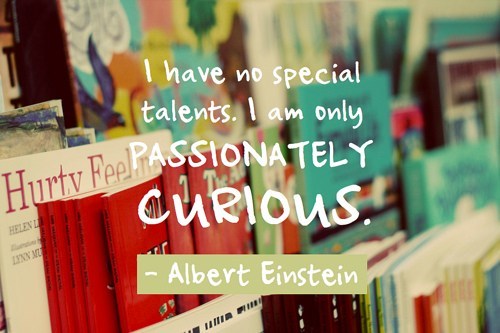Curiosity Promotes the Cognitive Process
I am a curiosity advocate. As a self-proclaimed data nerd and fact finder, I have to know and understand to do my best work. If a random curious thought pops into my head, I have to engage in some light to heavy internet stalking or research before I am satisfied enough to move-on and get back to what I was doing. Some might call this distractibility, but I call this my curious nature.
My curiosity was piqued a couple weeks ago when I stumbled upon an article published by NPR about research highlighting the cognitive benefits of curiosity. According to the research, the limbic reward system of the brain illuminates when a person becomes curious. For years, teachers have intuitively used curiosity as a teaching method in classrooms. The research found that we learn more effectively and retain more information with curiosity as our guide.
Curiosity can Squash Stereotypes
There's no doubt that curiosity has led to ground-breaking research and exciting scientific discoveries -- for it was Albert Einstein who said, "I have no special talents. I am only passionately curious." But, there are also other benefits garnered from developing our curiosity, which can change the way we view ourselves and interact with others. Research indicates that the degree to which we are curious is correlated with our level of openness to personal growth opportunities and our capacity to connect with others. If curiosity opens us up to personal development and more genuine connections with others, then curiosity must also have the power to squash social stereotypes. If we meet someone who is different from us -- whether it be by culture or by personality -- if we use curiosity as a way to try and understand that person we have a better chance of bypassing judgment and not reinforcing already established stereotypes or creating new ones.
One of the most valuable assets of curiosity is its ability to seek to understand another person -- fully and truly -- without judgment. I find that the most open and least judgmental people are curious. They are not intrusively curious or creepily curious so as to judge or to be nosy, but they possess a curiosity that authentically wants to understand. When someone has a differing viewpoint from my own approaches a conversation with me from a place of genuine curiosity, it disarms my defenses, and we can have a productive conversation. When I truly seek to understand another person's beliefs, I can authentically examine my own assumptions and opinions, and decide if I can stick to my beliefs or if I actually feel a shift in how I feel. When we are defensive and unwilling to listen and consider another person's point of view, we are not engaging in curiosity and have shut-down part of the cognitive process.
Curiosity has the Power to Prevent Stagnancy and Burnout
My inquisitive nature is ammunition to prevent me from one day finding myself experiencing burn-out or stagnancy in my career and in my relationships with others. Furthermore, I believe that the more curiosity we can develop, the more capacity for compassion we have. We are able to be more naturally curious, when we engage with others from a compassionate place. Compassion helps us to understand another person's feelings, predicament, and beliefs. Without compassion, authentic curiosity cannot flourish and vice versa.
The Rule of Thumb for an Appropriate Level of Curiosity
You should also be careful not to be too curious so as to rub a person the wrong way. Too many questions for an acquaintance or colleague can seem intrusive or you could be perceived as "nosy." So what's the rule of thumb? If you are asking just because you want to know, and not out of a true desire to understand the other person and be open to other viewpoints, then don't ask.
5 Ways to Ignite and Nurture Your Curiosity
1. Engage from a place that seeks to understand and not judge.
What hot-button issue are you most passionate about? Perhaps it's a political issue and you think the opponents are down-right "stupid" for their stance on the issue. Really engage with someone of the opposing opinion and read several opinion pieces from reputable sources. Get curious about understanding how someone could think from this point of view. This can help you to have a more reasonable and productive debate with someone from the other side. You may find that the other person understands your position better, actually comes over to your side, or you experience a paradigm shift.
2. Next time you have a disagreement with someone communicate from a place of curiosity.
When we are angry we have the tendency to jump to conclusions and create our own assumptions about the other person's intent. Instead of making assumptions and operating from a place of anger, ask questions. This allows us to have a greater ability to understand the other person's actions, and reach a resolution together.
3. Every day spend at least 15 minutes getting curious.
Find out more about something that you are interested in. This can be anything from a new exercise class you are curious about to a current event.
4. Schedule a regular lunch, coffee, or drink date with a curious friend. Come on, we all have at least one curious friend who asks lots of questions because they are genuinely interested in your life and understanding you. Get together regularly with a friend like this and nurture each other's curiosity.
5. Get curious with yourself.
Maybe there is something about you that you don't understand. Ask yourself questions. Delve into the 'why's' around trying to understand your beliefs and/or actions.
My curious nature wants to know: How do you nurture your curiosity? And what does your curiosity allow you to do, feel, or accomplish?
